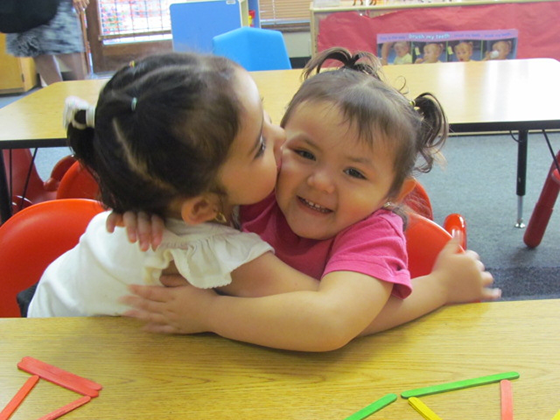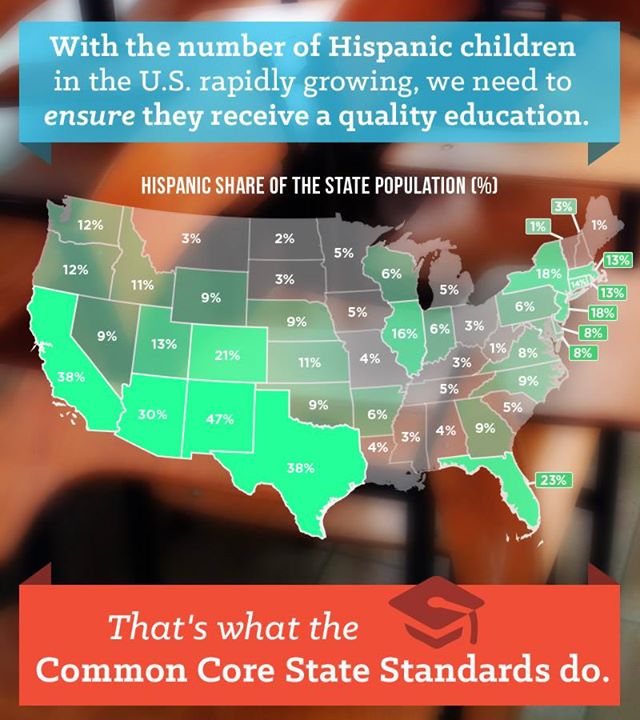Early Learning, Latinx Communities, and the Biden Administration’s American Families Plan: Progressreport.co Explores Universal Pre-K and Free Community College in a Two-Part Series
The Biden administration’s First 100 Days have finally come to pass and with them, its long-anticipated American Families Plan which it hopes will help the country recover from the pandemic and put millions of people on the path to a more sustainable middle-class life.
On the educational front, the plan seeks to improve child care and provide universal pre-K to some of the nation’s youngest learners. It also seeks to ensure that all Americans have an opportunity to pursue a college degree for an increasingly technical workforce.
Like many civil rights organizations, UnidosUS believes educational policies like these could improve the lives of millions of Americans who are low-income or are part of historically underserved groups such as immigrants, communities of color, people with disabilities, and English learners (ELs), as well as those identifying as women or LGBTQ. In fact, in recent years, it has been working in partnership with such groups to broadcast that very message. The following post is of the first of a two-part analysis of the American Families Plan and the ways it intercepts with the work of UnidosUS, its Affiliates, and partner organizations.
Biden’s speech sought to recognize the rights of all Americans, starting with the youngest by discussing how his plan would give children an early start on the preparation they need to join an increasingly technical workforce. He pledged to provide universal pre-K to all three and four-year-olds, subsidize child care, as well as provide paid family leave and increase the minimum wage to $15 an hour.
Biden noted in his speech that adding universal high-quality preschool to all children ages three and four, regardless of their background “puts them in a position to be able to compete all the way through 12 years (of school) and increases exponentially their prospect of graduating and going on beyond graduation. Research shows when a young child goes to school not day care, they’re far more likely to graduate from high school and go to college, or something after high school.”
According to data UnidosUS collected from the U.S. Census Bureau, by 2060, an estimated one-third of three and four-year-olds in the United States will be Latino, and despite this, they currently have the lowest enrollment in early childhood education programs, representing just 49.5% of enrollment compared to 55.5% among their White peers. Those who do manage to enroll in a public early learning centers often face financial, linguistic, and cultural barriers, and UnidosUS says that increasing access to these programs, getting them enrolled and on the path to a more streamlined educational experience goes far beyond free tuition.
During a February webinar hosted by UnidosUS partner National Black Child Development Institute, Shana Bartley, Director of Community Partnerships at the National Women’s Law Center, noted that an estimated 2.1 million women were pushed out of America’s overall labor force in 2020, and nearly half of them were Black and Latina.
“We’re seeing almost an entire generation’s loss of workforce participation gains for women in a year,” noted Bartley. “We got into this situation because in the United States we have let one of our most valuable and important community resources—child care—exist in a private, market-based system with roots in sexism and racism. It’s not an accident, but the pandemic showed us why this cannot continue.”
For those who can continue their work in early childhood education, “the absolute demands on the staff and the administrators are just overwhelming,” Stechuk told webinar participants. For example, he said staff at the UnidosUS Affiliate East Coast Migrant Head Start have been “fighting COVID on a daily basis” and as a result, their workloads have dramatically increased because they must follow step-by-step screening procedures when parents drop off and pick up their children. And all of the documentation of COVID-19-related concerns means an increase in paperwork.
In fact, these issues make him question whether a $15 national wage hike would be enough to help accommodate early childhood professionals.
“Now more than ever we need to re-examine early childhood education. We need to rebuild it better, and we particularly need to supply programs serving Black and Latino communities with the resources that they need,” Stechuk said. “We need to support the workforce, and to advance and to remain in a position, we need to take on the issue of compensations so that Black and Latino educators receive salaries that are more closely aligned with the demands of their position.”
In line with trends in the demand for higher degrees, many states are now requiring early childhood educators to obtain a bachelor’s, but for many, that means finding the time and money to do so. In addition to the Biden administration’s efforts to make community college free for all Americans, he believes more could be done to provide scholarships to students hoping to join the early childhood workforce or go back to school to obtain their bachelor’s. And while in these programs, he says they must be provided greater social, cultural, and linguistic supports for responding to the needs of an increasingly diverse population.
The People Take the Lead
Early childhood advocates in partnership with UnidosUS have also been quick to point out how much members of the community have become more civically engaged since the pandemic began, showcasing how well-equipped they are for advising policymakers on best avenues for making these adaptations.
“Communities of color are doing everything they can to weather the pandemic in systems that are not designed to meet their families’ needs.” Bartley noted during the NBCDI webinar. “Data doesn’t capture how people rise to meet these occasions, but the history of our communities of color in the U.S. show that time and time again, we come together to support each other through these times of crisis.”
Stechuk offered webinar participants several examples of this from the UnidosUS Affiliate Network.
Staff and participants of UnidosUS Affiliate El Centro de la Familia in Salt Lake City, Utah, has expanded the organization’s concept of family engagement by providing free meals to hungry families across multiple counties, and by developing public awareness campaigns that expose the unsafe conditions workers in Utah’s meat packing industry are currently facing.
“They were literally saving lives by taking on the advocacy work to change the unsafe working conditions that were present,” Stechuk said.
The 122-year-old UnidosUS Affiliate Gads Hill Center in Chicago has delved into it many years of data to write and publish an article in a peer-review journal comparing its community outreach strategies in serving children and families during the Spanish flu of 1918 with its current ones.
“The program is now assessing families on a weekly basis in order to keep up with the demands of impact of the pandemic,” Stechuk noted, adding that the pandemic has led the program leadership of many UnidosUS Affiliates to reexamine their role and their model of practice.
“Programs are doing the work of responding to the pandemic, and at the same time, they’re revisiting their mission, they’re reflecting on their work, they’re looking for new ways to support children’s learning, to support family strengths, to support their staff, to consider their models of work, and they’re specifically looking for ways to advance the rights and the flourishing communities of color,” he said. During President Biden’s speech on Wednesday, he seemed to be keen on harnessing that community-based leadership.
“Our constitution opens with the words, as trite as it sounds, ‘we the people,” he said. “Well, it’s time to remember that we, the people are the government. You and I. Not some force in a distant capital. Not some powerful force that we have no control over. It’s us! It’s we the people.”
That same cautious optimism was echoed in a statement Thursday by UnidosUS President and CEO Janet Murguía. She applauded Biden for “thinking big,” noting that UnidosUS supports the American Families Plan’s efforts to address everything from jobs to child poverty, tax policy, to health care, and education to safety net programs and infrastructure, but added, “we would caution that while Latinos disproportionately need these reforms, without a targeted effort to reach the community, their dose of hope may never be fully realized. It is imperative that the administration has a plan that is fair, equitable, and inclusive to ensure that all our country’s communities, including Hispanics and mixed-status families, have the access needed to take advantage of these measures.”
-Author Julienne Gage is an UnidosUS senior web content manager and the editor of ProgressReport.co.




